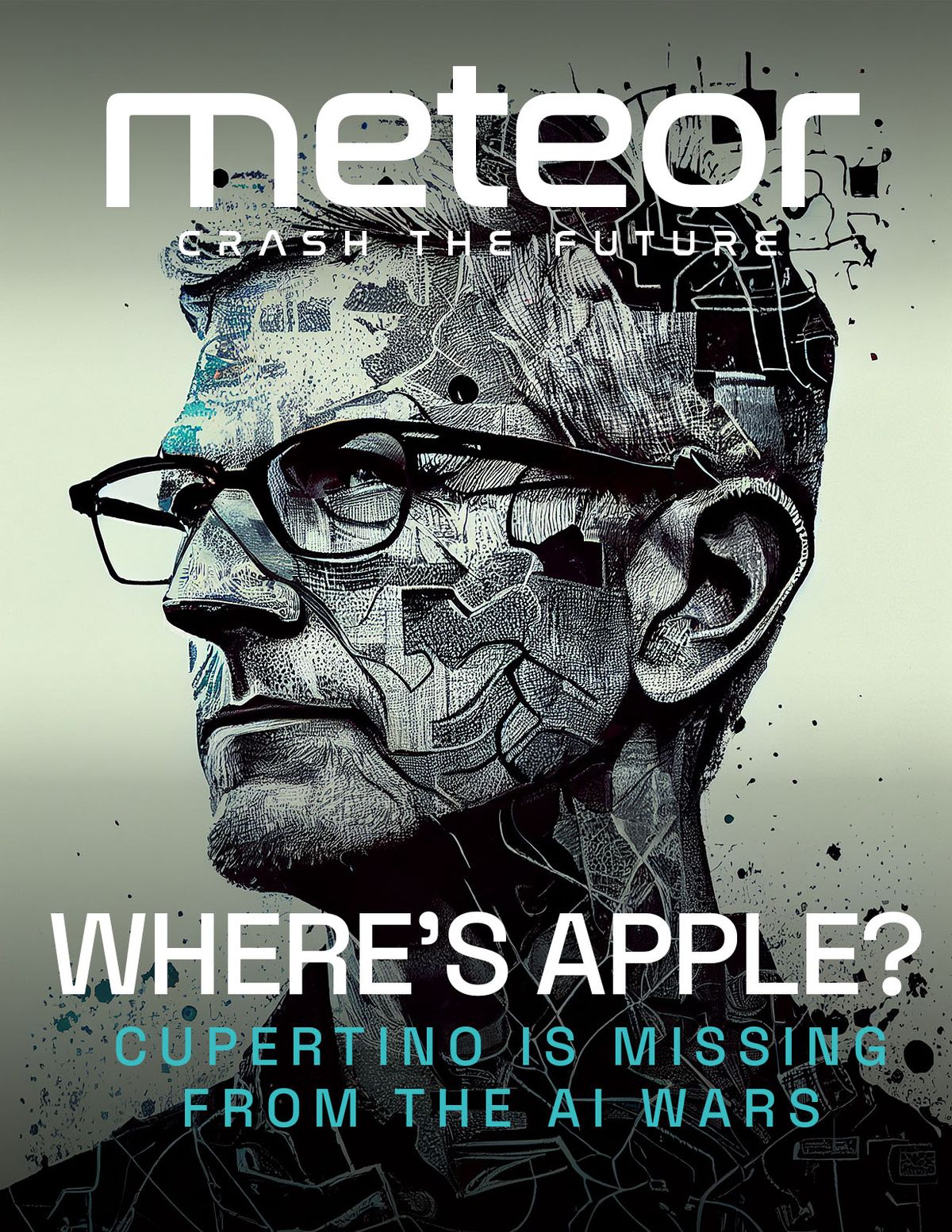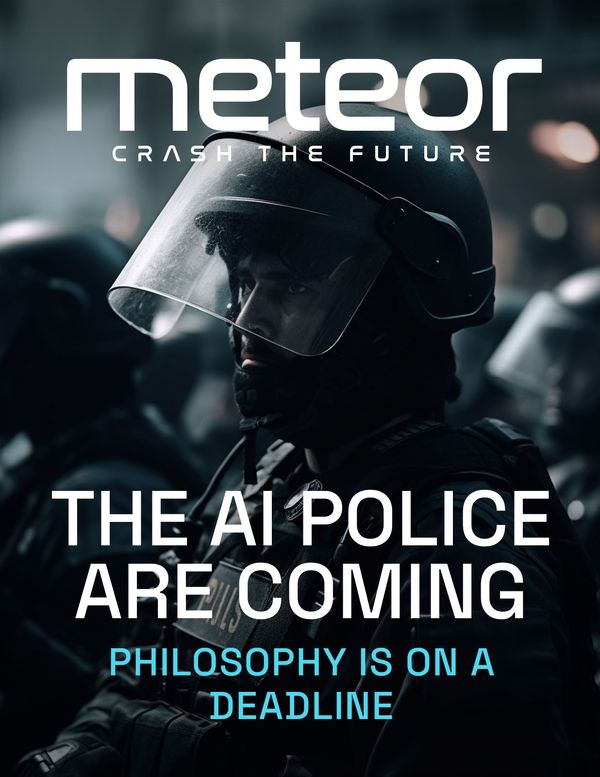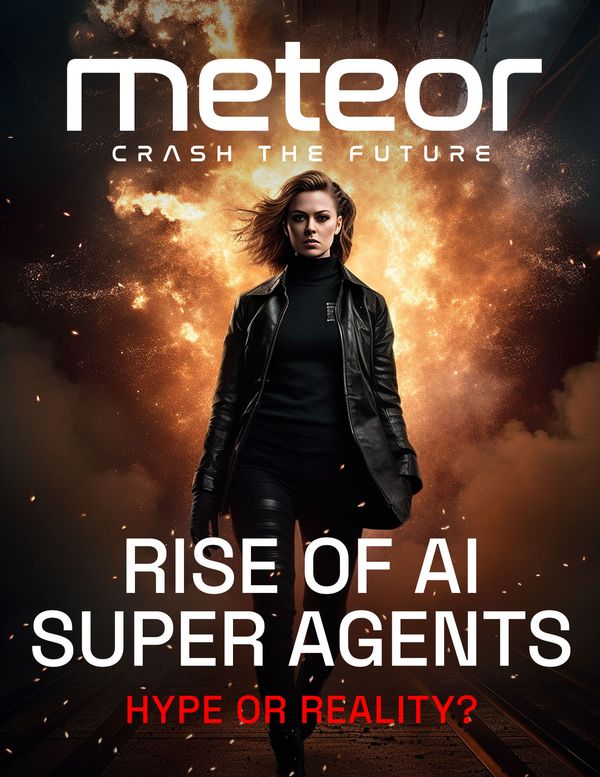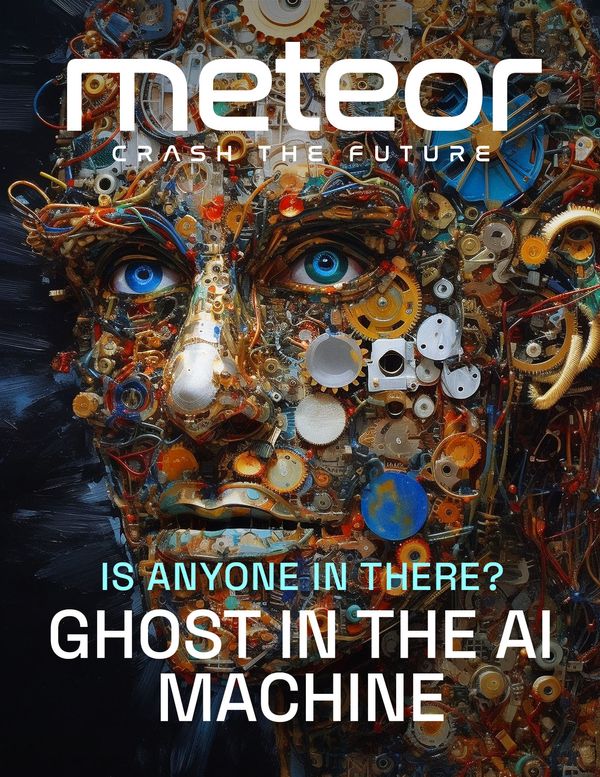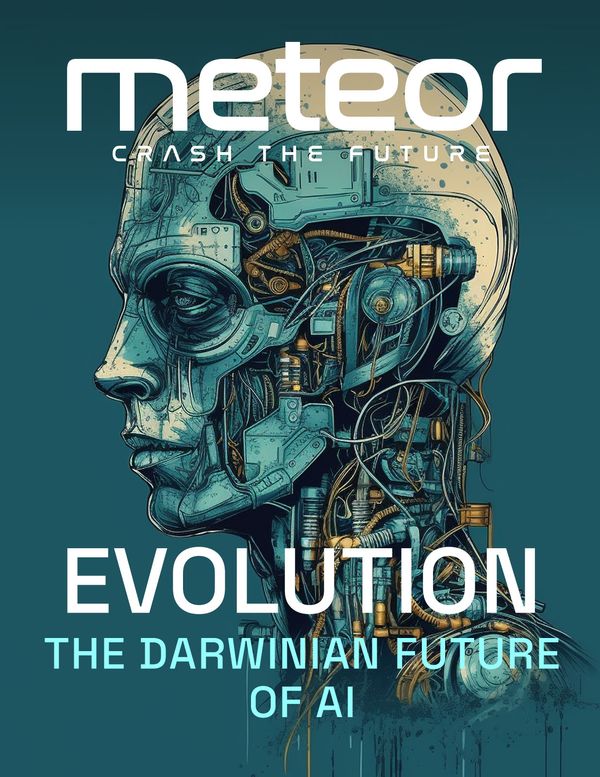Today in Meteor
- Disrupt: Where's Apple in the AI war?
- Compile: Bitch better have my NFT money
- Beyond: Ancient humans dined out
- Artificial Unintelligence: "Socratoes"
Disrupt
Big ideas that change the world

The aliens have landed on planet earth and they didn't come in rocket ships. They came in computers, made by us.
We're a bit afraid, but we also want to get to know them, see how they respond, feel what they do. We want to prod them and poke them, just to see what happens. Maybe they'll bite, but damn are they cool! We want to talk (type) with these strange machines first hand, bring them out from behind the corporate curtain and put them to the test.
It's an unexpected social reaction that has caught some of the most far-seeing and far-thinking technologists flat footed. How else explain Google, an AI giant, calling an internal "code red" as 100 million people rushed to try OpenAI's ChatGPT – a natural language model built by a Microsoft funded startup that's had the fastest uptake of any technology in history?
It feels like a paradigm shift equal to the birth of the personal computer and the Internet – the nuclear bomb? – and it will shake our most steadfast beliefs about what's durable and important in how we design and create the next generation of technology products and services.
So where is the world's largest and most influential consumer tech company in this race? (And it is a race.) We're talking about Apple, and we couldn't really see it anywhere important. And yet, as with Google and Microsoft and the battle over search, the stakes could be enormous for smartphones and the one that started it all.
So we invited Leander Kahney, editor and publisher of Cult of Mac, a daily Website covering all things Apple, to help us dive into and understand the company's AI strategy, plans and execution.
The following is an edited transcript of a live audio interview on Twitter Spaces Friday between Kayney and Meteor co-founders Neil Katz and Evan Hansen.
Neil: We've seen this early round of the AI war, Microsoft and Google are facing off against each other. We'll see how that war plays out.
But it is shocking that the largest technology consumer company in the world, Apple, seems to be nowhere to be found.
If you think about the power of what these natural language bots can do, you can imagine a completely different way to interact with your smartphone, which would be a significant threat to their business.
And are we right to think Apple is way behind here, or maybe they've got some stuff in the lab that is going to delight us all very soon.

Leander: Yeah I think Apple has actually got quite a lot of AI technology you can see every day when you interact with your iPhone or your iPad.
[Apple CEO] Tim Cook recently said that they treat it as a horizontal technology, so that goes across all their products. They don't have an AI chat bot and in fact their most front-facing AI, Siri, is an embarrassing disaster.
They've got an AI everywhere [mindset] and I think Tim Cook has said quite a few times that it's going to infect every single thing that they do.
And a lot of the stuff going seems to be pretty good. Face ID works exceptionally well. You can grow a beard or shave a beard or shave your hair and it'll adapt over time.
Evan: One of the interesting things that comes out of this for me is that saying the AI is there, but it's invisible right?
Leander: Yeah exactly. Like with Google it's invisible. You don't actually know you're interacting with an AI, and the AI that you do interact with is dumber than a bag of hammers. Siri could definitely benefit from something like ChatGPT. That conversational ability would improve Siri by leaps and bounds if they could add that.
Evan: An interesting question is could you port ChatGPT to these types of systems and say is it more than just a speech recognition problem?
So maybe Apple has got to find themselves a generative AI partner, an LLM (large language model) partner [like OpenAI and Microsoft]. They haven't been able to work it out themselves.
Leander: If you're one of the leading AI researchers in academia I don't think Apple's going to be your number one company that you would go to.
[But] the company's so secretive it's very difficult to know exactly what they are working on, like the whole AI car project. And there've been various rumors of this troubled project over the years.
Tim Cook acknowledged it last year and said that they were going to treat it really as not just an AI problem for cars, it's an AI problem across the spectrum. They're researching AI far more broadly and trying to apply it to everything that Apple does and all of its different products.
So it's not just going to deliver developing AI for a car. Whatever they're developing for the car they hope will be broadly applicable within other areas.
Neil: You mentioned some of the AI technology that Apple has and of course Tim Cook said sure, we're spreading it around like peanut butter all across the company. AI. You want AI? Yeah we got AI. But these [new breakthroughs] seem like a different version of AI.
What's been kind of shocking about GPT coming forward is it feels like a completely new way to interact with a computer. It's like a new UX. And that to me feels like it might be a fundamental threat to Apple.
If Google can put out a phone that fundamentally you can talk to, and it can do everything for you like magic, instead of the way we're interacting with phones today, and Apple's kind of a few years behind on that, that feels like a real potential threat to their business.

Leander: Yeah, I mean, if it pans out. One of the interesting things about ChatGPT is that it really isn't an artificial intelligence. It's not intelligent at all. It's using statistics basically to give you the answers you want.
And it's very very cleverly architected. But I think they're going to have a huge trust problem. There was a hiccup in Google's presentation yesterday and their market cap went down $10 billion or something like that.
It's that persistence of knowing what you're talking about, to be able to have a conversation, I think. If that can be brought to computer or phone interfaces that is extremely powerful and it would be the next step I think for something like Siri.
Neil: You can see the kernel of what you could imagine, having a phone and just saying, 'Hey phone, do me a favor. Would you call Amazon customer service and return this package for me? Thanks.'
Then go off and it would do that call for you, you know, the phone.
'Would you do me a favor? Would you text my kids and tell them we're having dinner tonight at so-and-so restaurant?'
You could just imagine it doing all these things that you would ask that you thought you could ask Siri to do five years ago but really you couldn't.
And now it feels like the language models are there. And I get what you're saying. It's not factually perfect, it's not good for that. But it seems to be good at speaking to people and being your language interface to a computer.
Leander: I think these interfaces are inevitable, and we will see them probably sooner than later, given the advances. Right now I don't think anyone can say Apple's behind, because I don't think anybody else is far ahead.
You cannot take ChatGPT and use it as a machine interface right now. I don't think you could do that. Google's not going to be doing it with Android. Even if they have the most advanced AI on the planet, I don't think they're going to be able to take what they have and make it into a conversational interface for all kinds of devices.
Neil: So your point of view is not that Apple's so far behind, but you think that this technology really isn't quite as capable as people think right now, and OpenAI's pulled off a bit of a magic trick.
Leander: I mean it's jaw dropping. You can see that it's getting closer. It's a huge step forward but not quite.
Evan: You can see people creating specific applications for GPT like, deal with the customer service people on a chat and automate that for me, and get me a discount or cancel my account. We've seen examples of that where people have actually done it.
So you start to see all of these cases where the actual payload is actually quite powerful and interesting. But what you're saying is there's a gap between getting access to those types of functionalities by just you saying, 'Siri fight my parking ticket.' And that just happens.
Leander: Yeah we're nowhere near that. No one's anywhere near that.
Evan: What do you see next, if you had to guess [for applied AI at Apple].
Leander: I would say it would be the AR/VR headset. That's going to have a lot of AI components, but I don't think it'll be primarily an AI product. That's expected for WWDC (Apple's World Wide Developers Conference), in June they'll show it off to developers.
And the car. Maybe the car really will come next year, that probably would be the biggest AI project, a self-driving smart car.

Evan: I think we see again in those predictions that Apple's really focused on making AI kind of more invisible and core to the product [as opposed to a standalone toy to play with].
Leander: Yeah right. Knight Rider, you know, a car where you could tell it where you want to go and it would take you there, and you wouldn't have to do anything more. We'll see. I'm a little bit skeptical about that too.
Although, I had a really freaky experience yesterday. I was running my bicycle along the street [in San Francisco] and this car coming towards me slowed down to let me through this narrow gap. And I waved to the driver. But when I looked in there's no one in there. It was, 'Oh wow.' Totally uncanny.
Really really uncanny. Really strange.
Evan: We'll see more.
Leander: Yep. The robots are among us.
This is a fascinating thing, it really does feel like there was a paradigm change with ChatGPT and I'd love to see it applied [to UX].
Evan: That's what's got everybody wondering, 'Where do these ripple effects end?' Does it let Microsoft win over Google in search? Android win over the iPhone?
I mean, these are questions that I think people wouldn't have bothered to take seriously not that long ago, but they're kind of back on the table now.
Leander: Right? Very true. And that'd be fascinating if they can apply these interfaces to our devices. I mean that really would be a huge leap.
Compile
Quick dopamine hits
Really Unreal
A new video mixes real video footage with renders from Unreal Engine 5 built upon 1,500 photographs. Can you tell which is real and not?
Bitch better have my NFT money
Prior to Rihanna's scorching Super Bowl appearance, the producer behind "Bitch Better Have My Money," sold a portion of future royalties to 300 NFT holders. Michael Kasden breaks down how it works.
People are falling for their chat bots
Was bound to happen.
Deepfakes selling really fake cures on Tik Tok
Deepfake Joe Rogan sells supplements, sort of like real Joe Rogan.
Beyond
Web3 ain't eveything
Cancer gives man Irish accent
It killed him (the cancer, not the accent).
SpaceX's 31 engine burn looked as cool as it sounds
Elon's dress rehearsal for Mars continues.

Ancient humans ate surprising meal
A new look at 3 million-year-old stone tools reveal what was for dinner.
Artificial Unintellegince
Bloopers from the latent space
While trying to make portraits of the philosophical masters including Socrates, I accidentally typed "Socratoes." The AI seemed to think it was some type of new processed food product and in one case thought a zombie alien would be eating it.
– Neil Katz

Thanks for reading! Please take just 30 seconds to tell us what you love or hate about this issue.

